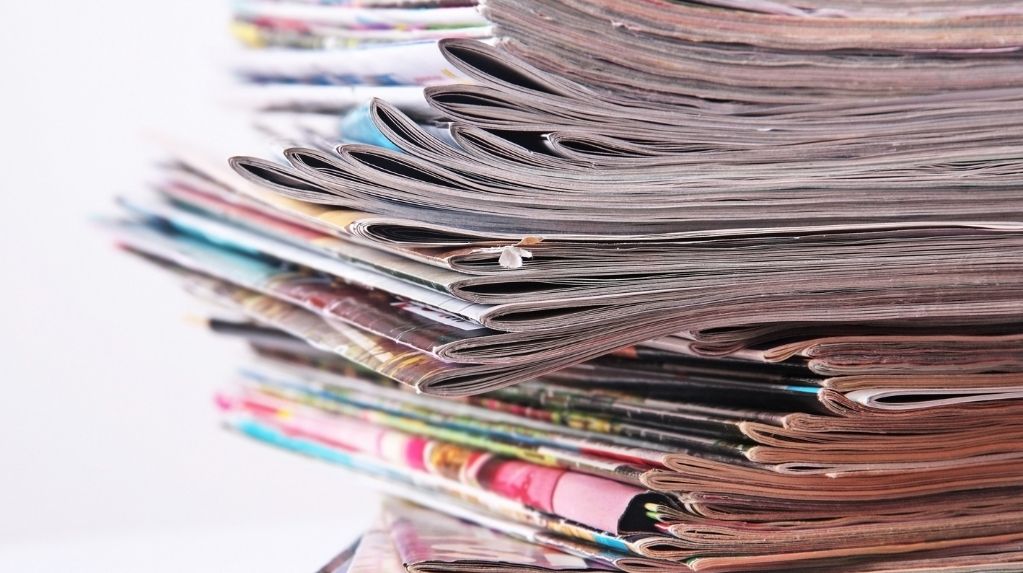
While most of today’s younger generation have swapped them out in favour of digital media, magazines are still very present in the market today. Whether you’re an avid subscriber or a business with a waiting room full of them, you’ll eventually face the problem of how to deal with old and unwanted magazines.
Recycling comes to mind as the first (and most eco-friendly) option for many people, but can magazines be recycled? In a word, yes.
Most magazines can be recycled along with regular matte paper products, but some contain a type of plastic known as polyethylene, making them unrecyclable.
What materials are magazines made from?
Magazines are made primarily from paper pulp, which can come from recycled, mechanical, or chemical sources. During the production process, publishers typically select a specific type of paper grade that meets the magazine’s quality and requirements. Different paper grades contain various ratios of recycled, mechanical, or chemical pulp, each producing paper to suit certain printing styles.
Are glossy magazines recyclable?
Most of the confusion around whether magazines can be recyclable comes from the glossy appearance and texture of magazines — the processed look of the magazine can make it seem like the paper material is not suitable for recycling.

The fact is that most magazines are recyclable, glossy or not. The glossy texture is created using a mixture of naturally derived minerals and resins that are absorbed by the paper fibres, creating a smooth and polished coating over the surface. In the recycling process, these components can be treated using chemical processes, resulting in clean paper pulp that can be used to create cardboard, egg cartons, or cat litter.
However, some glossy magazines achieve their appearance using a plastic coating called polyethylene (PE). The presence of plastic in these magazines makes them unrecyclable.
How to tell if a magazine is recyclable or not
Here’s an easy way to tell if a magazine is made using natural elements or plastic: rip it.
If the paper material can be easily ripped or torn, it’s likely that it is recyclable. Paper that can’t be torn easily or becomes deformed or ‘stretched’ instead of tearing is usually a sign that it has been coated with plastic.
Another easy test is to soak the magazine (or a page of it) in water for a long time. Natural paper will become wet and tear much more easily, while plastic-coated paper will remain relatively unchanged.
What to do with unwanted or unrecyclable magazines
Recyclable magazines can go into any recycling bin that accepts paper waste, including household yellow-lid bins.
Unrecyclable magazines pose a different problem — they can’t be disposed of in recycling bins. Here are some alternative ways to get rid of them instead of simply tossing them into the bin:
Donation
If you’re no longer reading the magazines, you could simply donate them to an organisation that accepts them. This way, your old magazines can become new reading material for someone else instead of simply filling up a landfill.
Organisations in NSW that accept magazine donations include the State Library of New South Wales, businesses with a waiting room, or not-for-profit organisations like Lifeline.
If you’re planning on donating your old magazines, make sure that they are in a relatively clean and readable condition.
Drawer or box liners
Plastic-coated magazine pages are partially resistant to water, making them good options to line the bottom of kitchen drawers or storage boxes instead of plastic litter box liners.

Gift wrappers
Magazine paper can be used as an alternative for gift wrapping paper or even as loose-fill packaging material — both of which are typically not recyclable either.
Wrapping gifts in magazine paper can seem a little unconventional, but considering that most wrapping paper is ripped and discarded anyway, getting some additional use out of your used magazines beats disposing of them outright.
As for using them as packaging material, magazine paper can be crushed into loose balls to act as a cushioning layer for shipped items.
Recycle old magazines with Ridly
If you’ve got a large batch of old magazines to recycle, Ridly Rubbish Removal can take it off your hands and deliver it to a proper recycling facility in Sydney. Our paper and cardboard collection and recycling services are available round the clock, even on the weekends.